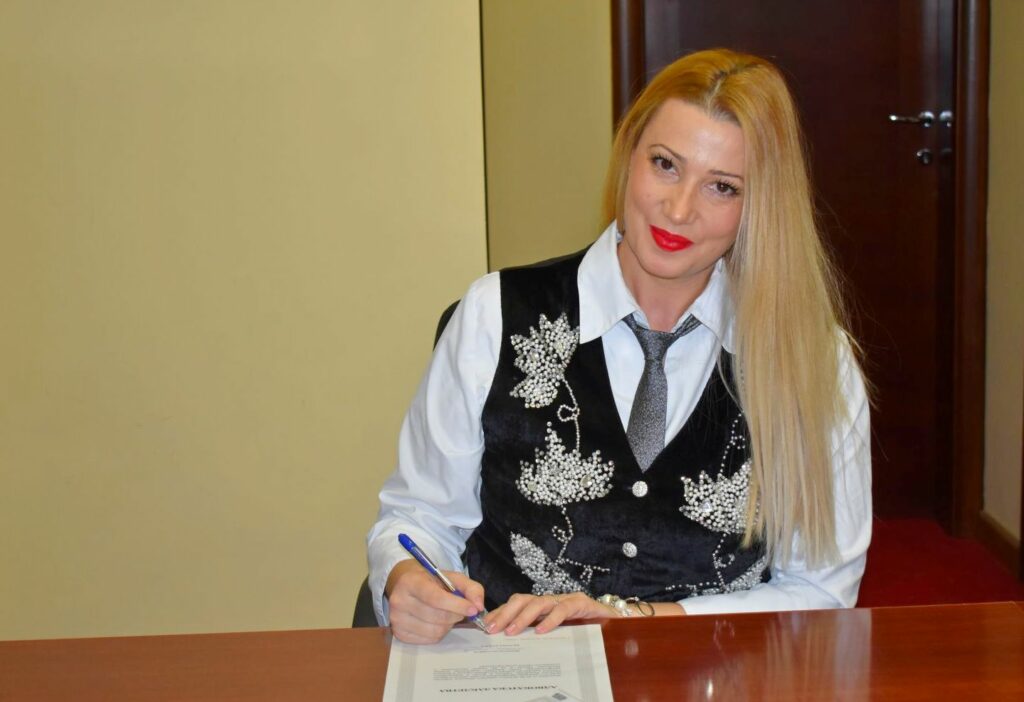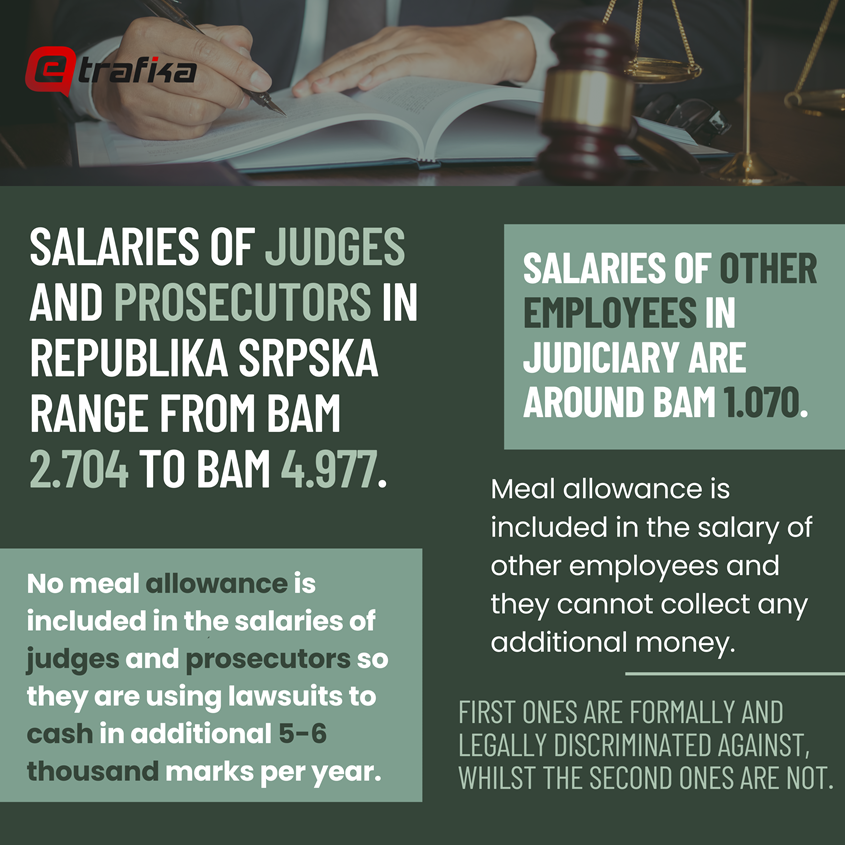Judges and prosecutors from Republika Srpska are suing this entity for discrimination and are increasing their incomes by five to six thousand marks a year in the courts. The reason is that their monthly salary, which ranges between BAM 2.704 and BAM 4.977 net, does not include a meal allowance by law. Unlike them, other workers in the judiciary, whose salary is around BAM 1.070 per month, do not have this option, because their meal allowance is already included in the mentioned amount.
Written by: eTrafika’s investigative team; Illustration: Pixabay
In practice, “lower” workers who formally and legally receive a meal allowance, and “the judicial office holders”, who, in addition to high salaries, do not receive the meal allowance, do enter the judicial institutions at the same door. The research of eTrafika and the documentation in the possession of our newsroom have revealed that a large number of them have an established practice of filing lawsuits and subsequently collecting five to six thousand marks annually from the budget. Therefore they are not too interested in adoption of new laws that would equalize them with other colleagues from the judiciary, but rather remain discriminated against.
Two laws
The Republika Srpska judiciary trade union has a few months ago, together with other unions, protested demanding an increase in salaries, but also equal rights for all employees in this field. They agree that there is discrimination in the judiciary of Republika Srpska, but not against prosecutors and judges. They point out that administrative workers, authorized officials in the correctional institutions and the court police are actually discriminated against.

“Judicial office holders receive their salary according to the Law on Salaries of Judges and Prosecutors, while everyone else according to the Law on Salaries of Employees in the Judicial Institutions of RS, and these are completely separate laws”, Siniša Petrović, president of the Trade Union of Employees in the RS Judiciary, explained the difference between employees working in the same institution.
The problem is that the law, which applies to the administrative employees, stipulates that “remunerations of up to 35 percent of the basic salary for the difficulty, nature of the work and special working conditions, as well as meal and holiday allowances, are included in the basic salary and cannot be separately disclosed.”
“It is obvious that all allowances are included in the basic salary, so the question arises as to what the basic salary of judicial employees really is,” emphasized Petrović.
Salary far below average
The journalists of our portal have looked for an answer to that question as well. The basic salary of the employees with secondary education, which make up about 70 percent of employees in the judiciary, is about BAM 1.070, including the meal allowance that is around BAM 187. The holiday allowance is also included, which is not nominally determined by the law, so we are going to assume that it equals the lowest salary of BAM 700, divided into twelve months, bringing us to an amount of about BAM 59 per month. When these two amounts are deducted from the basic salary, we get BAM 824, which is the real basic salary of an employee with a secondary education in the judiciary. By the way, according to the data of the RS Institute of Statistics, the average net salary paid in November of this year was BAM 1.296.
On the other hand, the basic monthly salary of judges and prosecutors ranges from BAM 2.704 for judges of basic courts and district commercial courts, that is, for public prosecutors of district public prosecutor's offices, to BAM 4.977, which is the amount paid to the president of the Supreme Court of Republika Srpska, i.e. to the RS chief prosecutor. Unlike other workers, these amounts do not include meal allowance, so they cash in additional five to six thousand marks annually with discrimination lawsuits. Judicial office holders additionally receive a holiday allowance, which amounts to half of one monthly salary. Compensation for seniority for judges and prosecutors is 0.5 percent of salary, and for other employees 0.3 percent.
The employees do not want to speak publicly about this situation. Unofficially, they are a little more talkative, but even then they wave their hands more than they talk about obvious double standards.
“It was rather possible before the inflation, but today, with slightly more than a thousand marks, it is very difficult. On the one hand, we are faced with injustice in our own house, and on the other with the ridicule of ordinary people. They often say that it serves us right, that it is even too much, that we have “hooked onto the budget”, that we are trying to “get the honey without any bees” and similar platitudes that have nothing to do with reality. No one disputes that prosecutors and judges should have more than double the salaries, which is the case, but that we have a meal allowance included, while they are collecting additional money through the court, causes both anger and disappointment with many of my colleagues”, said eTrafika’s interlocutor, who has been working in a basic court in Republika Srpska for 11 years.
Discriminated on paper
Lawyer from Banjaluka, Helena Babić, who represented the judicial office holders in such cases, points out that judges and prosecutors are formally and legally discriminated against, and that the courts are only interested in the letter of the law, but not in the context and the amount of the salaries.
“Judicial office holders are primarily denied the right to payment of meal allowance, since they were not paid the allowance for a certain period of time, for which reason they were discriminated against in relation to all other employees in the Republika Srpska, as well as holders of judicial and prosecutorial offices in the Federation of BiH. There is no objective and reasonable justification for depriving judges and prosecutors from the RS of the right to a meal allowance and thus putting them in an unequal position compared to all other categories of employed persons”, said Helena Babić.
For this reason, the Constitutional Court of Bosnia and Herzegovina, in March 2022, determined that the Law on Salaries and Remuneration of Judges and Public Prosecutors in the Republika Srpska is not in accordance with the Constitution of Bosnia and Herzegovina and the provisions referring to the European Convention for the Protection of Human Rights and Fundamental Freedoms. This Law is not in accordance with the International Covenant on Civil and Political Rights either, because it does not contain provisions on meal allowance.
Lawyer Helena Babić says that the prosecutors primarily find their legal grounds in the BiH Law on Prohibition of Discrimination.

“It sets forth indirect discrimination exist when an apparently neutral provision, criteria or practice has or would have the effect of putting a person or group of persons into an unfavorable or less favorable position comparing to other persons”, said Babić.
She added that the forms of discrimination from the RS Labor Law refer to the employer's different treatment of the worker compared to other workers in similar situations.
“Furthermore, the law prescribes to whom the prohibition of discrimination applies, so it applies to all public bodies as well as to all natural or legal persons, both in the public and private sectors, in all areas, and especially in employment.”, explained Babić.
The Constitutional Courts, she adds, have already taken the position that certain provisions of the Law on Salaries and Remuneration of Judges and Public Prosecutors in the Republika Srpska are not in accordance with the Constitution and the Convention. However, there are conflicting decisions of the Constitutional Courts, different from case to case, and they do not take a unified position, so we currently have different judicial practice, which, she adds, does not instill legal certainty.
Court proceeding
In court proceedings, it is important that the prosecutor only makes it probable that discrimination occurred, and the defendant bears the burden of proving that there was no discrimination. If compensation for pecuniary damage is requested, as is the case here, it is proved that the plaintiff suffered pecuniary loss as a result of this discrimination.
The court then rules that discrimination exists because judges and prosecutors in the Republika Srpska did not receive meal allowance, while other workers in the Republika Srpska, as well as judges and prosecutors in the Federation did receive the aforementioned allowance. This obliges the Republika Srpska to pay judges and prosecutors a certain amount in the name of pecuniary loss.
In this particular case, discrimination refers to the status, since judges and prosecutors are judicial office holders. The European Convention for the Protection of Human Rights and Fundamental Freedoms stipulates that the enjoyment of rights and freedoms is secured without discrimination on any ground, including “other status”, and this term also includes exercise of a high function.
At the same time, the Judiciary Trade Union said for eTrafika that they will soon submit to the Constitutional Court of the Republika Srpska an initiative for the constitutional review of the provisions of the Law on Salaries of Employees in Judicial Institutions.
“I hope that the existence of discrimination and the unfair position of employees in the judiciary, and not of prosecutors and judges, will be proven in this way. Our union is doing everything to improve the material status of employees in the RS judiciary and I hope it will succeed in winning greater rights and better conditions for those employed in judicial institutions through negotiations”, said Petrović.










